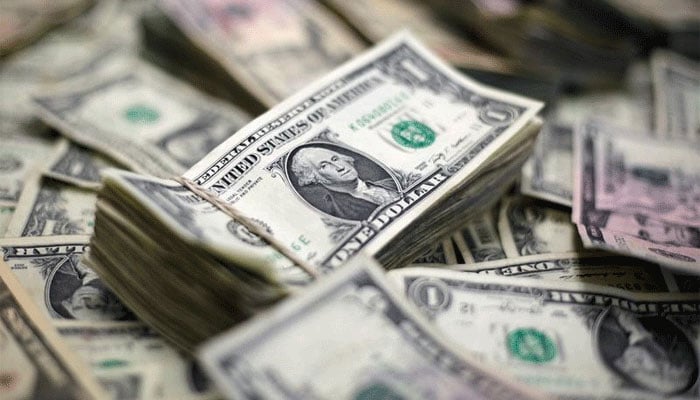SBP reserves fall to $9.329bn on debt repayments
The State Bank of Pakistan’s foreign exchange reserves dropped by $389 million or 4 percent during the week ending July 15, putting pressure on deteriorating balance of payments
KARACHI: The State Bank of Pakistan’s foreign exchange reserves dropped by $389 million or 4 percent during the week ending July 15, putting pressure on deteriorating balance of payments.
The reserves held by the central bank fell to $9.329 billion from $9.718 billion a week ago, the SBP said in a statement on Thursday.
The decline in the foreign currency reserves was because of external debt repayment, it added. The SBP’s reserves are enough to cover 1.6 months of imports.
The country’s total liquid foreign reserves declined $369 million or 2.4 percent to $15.242 billion. The reserves of commercial banks, however, rose to $5.913 billion from $5.893 billion.
The reserves have been dwindling on the back of higher current account deficits amid higher growth in imports. The increasing foreign debt repayments with drying dollar inflows worsen reserves’ position.
The rupee has been under severe pressure from the falling reserves, despite last week’s staff level agreement reached with the International Monetary Fund (IMF) that would pave the way for a disbursement of $1.17 billion under resumed payments of a bailout package.
Moody’s Investors Service showed concerns over the government ability to complete the IMF’s loan programme. The rating agency fears the government may face difficulties implementing tough revenue-raising reforms, such as steadily increasing petroleum levies and raising power tariffs, especially in the run-up to the next general elections scheduled for mid-2023.
This could be worrisome as the country’s financing requirement remains high owing to paying for imports and service external debt.
The IMF executive board will approve the $1.2 billion disbursement in the third quarter of this year if Pakistan focuses on policy priorities that the IMF has identified, including implementing the fiscal 2023 budget, making progress on power sector reforms, lowering inflation, reducing poverty, enhancing governance and mitigating corruption, it said.
The current account deficit has widened since mid-2021 on higher food and oil prices and stronger demand for imports; combined with domestic political uncertainty, this has driven a sharp depreciation in the Pakistani rupee, further pushing up import costs.
“However, we expect the deficit to narrow to 3.5-4 percent of GDP in fiscal 2023 from 4.5-5 percent in fiscal 2022 as imports moderate amid slowing growth and measures to curb nonessential imports,” it stated.
-
 Timothee Chalamet Felt '17 Again' After Reunion With 'Interstellar' Director Christopher Nolan
Timothee Chalamet Felt '17 Again' After Reunion With 'Interstellar' Director Christopher Nolan -
 Conan O'Brien Speaks First Time After Rob Reiner's Killing
Conan O'Brien Speaks First Time After Rob Reiner's Killing -
 Giant Tortoise Reintroduced To Island After Almost 200 Years
Giant Tortoise Reintroduced To Island After Almost 200 Years -
 Eric Dane Drops Raw Confession For Rebecca Gayheart In Final Interview
Eric Dane Drops Raw Confession For Rebecca Gayheart In Final Interview -
 Trump Announces New 10% Global Tariff After Supreme Court Setback
Trump Announces New 10% Global Tariff After Supreme Court Setback -
 Influencer Dies Days After Plastic Surgery: Are Cosmetic Procedures Really Safe?
Influencer Dies Days After Plastic Surgery: Are Cosmetic Procedures Really Safe? -
 Eric Dane Confesses Heartbreaking Regret About Daughters' Weddings Before Death
Eric Dane Confesses Heartbreaking Regret About Daughters' Weddings Before Death -
 Nicole 'Snooki' Polizzi Reveals Stage 1 Cervical Cancer Diagnosis
Nicole 'Snooki' Polizzi Reveals Stage 1 Cervical Cancer Diagnosis -
 Timothee Chalamet Admits He Was 'grumpy' Before Beau Kylie Jenner's Unexpected Move
Timothee Chalamet Admits He Was 'grumpy' Before Beau Kylie Jenner's Unexpected Move -
 Hilary Duff’s Son Roasts Her Outfit In New Album Interview
Hilary Duff’s Son Roasts Her Outfit In New Album Interview -
 Alexandra Daddario, Andrew Form Part Ways After 3 Years Of Marriage
Alexandra Daddario, Andrew Form Part Ways After 3 Years Of Marriage -
 Eric Dane Rejected Sex Symbol Label
Eric Dane Rejected Sex Symbol Label -
 Avan Jogia Says Life With Fiancee Halsey Feels Like 'coming Home'
Avan Jogia Says Life With Fiancee Halsey Feels Like 'coming Home' -
 Kate Middleton's Role In Handling Prince William And Harry Feud Revealed
Kate Middleton's Role In Handling Prince William And Harry Feud Revealed -
 Tucker Carlson Says Passport Seized, Staff Member Questioned At Israel Airport
Tucker Carlson Says Passport Seized, Staff Member Questioned At Israel Airport -
 David, Victoria Beckham Gushes Over 'fiercely Loyal' Son Cruz On Special Day
David, Victoria Beckham Gushes Over 'fiercely Loyal' Son Cruz On Special Day




